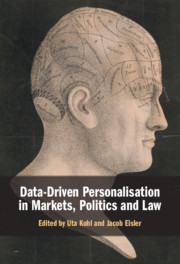Book contents
- Data-Driven Personalisation in Markets, Politics and Law
- Data-Driven Personalisation in Markets, Politics and Law
- Copyright page
- Contents
- Figures
- Tables
- Contributors
- Preface
- Part I Introduction: Theoretical Perspectives
- Part II Themes: Personal Autonomy, Market Choices and the Presumption of Innocence
- Part III Applications: From Personalised Medicine and Pricing to Political Micro-Targeting
- Part IV The Future of Personalisation: Algorithmic Foretelling and Its Limits
- 14 Regulating Algorithmic Assemblages: Looking beyond Corporatist AI Ethics
- 15 Scepticism about Big Data’s Predictive Power about Human Behaviour: Making a Case for Theory and Simplicity
- 16 Building Personalisation: Language and the Law
- 17 Conclusion: Balancing Data-Driven Personalisation and Law as Social Systems
- Index
14 - Regulating Algorithmic Assemblages: Looking beyond Corporatist AI Ethics
from Part IV - The Future of Personalisation: Algorithmic Foretelling and Its Limits
Published online by Cambridge University Press: 09 July 2021
- Data-Driven Personalisation in Markets, Politics and Law
- Data-Driven Personalisation in Markets, Politics and Law
- Copyright page
- Contents
- Figures
- Tables
- Contributors
- Preface
- Part I Introduction: Theoretical Perspectives
- Part II Themes: Personal Autonomy, Market Choices and the Presumption of Innocence
- Part III Applications: From Personalised Medicine and Pricing to Political Micro-Targeting
- Part IV The Future of Personalisation: Algorithmic Foretelling and Its Limits
- 14 Regulating Algorithmic Assemblages: Looking beyond Corporatist AI Ethics
- 15 Scepticism about Big Data’s Predictive Power about Human Behaviour: Making a Case for Theory and Simplicity
- 16 Building Personalisation: Language and the Law
- 17 Conclusion: Balancing Data-Driven Personalisation and Law as Social Systems
- Index
Summary
Personalisation can provide notable efficiencies and economic gains, but also unintended negative effects. Most accounts focus on potential negative impacts on individuals or categories of individuals and not the broader consequences or ripple effects of incorporating AI into existing social systems. This chapter explores such issues via an ‘AI ethics’ perspective, the dominant overarching discourse for ‘regulating’ AI for the good of society, commonly characterised as self-policing of AI system use by private corporate actors, sanctioned by government. The discussion critiques that self-policing by locating AI ethics within established traditions of corporate social responsibility and institutional ethical frameworks whose shortcomings translate into a systemic inability to be truly Other-regarding. It shows, referencing the recent EU AI ethics initiative, that even well-intentioned initiatives may miss their target by assuming the desirability of AI applications, regardless of their wider impacts. This approach simply tinkers with system details of minor consequence compared to the broader impacts of AI within social systems, captured by the idea of ‘algorithmic assemblage’.
Keywords
- Type
- Chapter
- Information
- Data-Driven Personalisation in Markets, Politics and Law , pp. 243 - 262Publisher: Cambridge University PressPrint publication year: 2021
- 2
- Cited by



